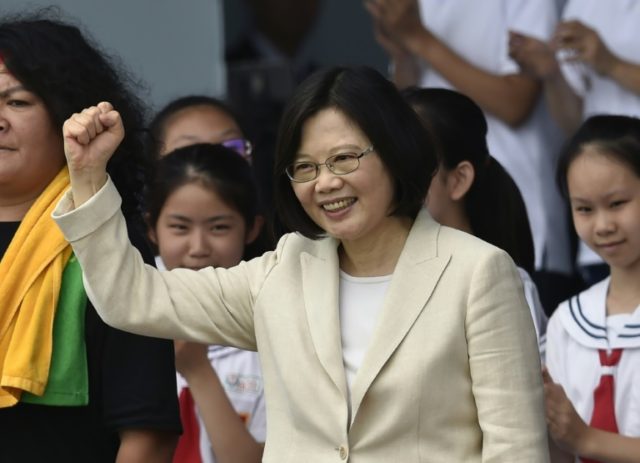Taipei (AFP) – Taiwan’s new president Tsai Ing-wen urged China to give its people more rights and “heal past wounds and pain” on the 27th anniversary of the Tiananmen Square crackdown Saturday.
Her remarks came after the island’s first ever Tiananmen commemoration in parliament on Friday, as lawmakers urged the government to address human rights issues in its dealings with China.
Ties with China have rapidly cooled since Tsai won the presidency in January, with Beijing highly distrustful of her traditionally independence-leaning Democratic Progressive Party (DPP).
Although Taiwan has been self-ruling since a split with the mainland in 1949 after a civil war, China still sees it as part of its territory.
In her first comments on Tiananmen as Taiwan’s leader, Tsai said China must be open about the 1989 crackdown on pro-democracy protests in Beijing, which by some estimates left more than 1,000 dead.
The protests are branded a “counter-revolutionary rebellion” by Chinese authorities and many on the mainland remain unaware of what happened.
“Do not let June 4 forever be unspoken between the two sides. Only the ruling party on the other side can heal the past wounds and pain of the Chinese people,” Tsai said in a post on her Facebook page.
Tsai said she was not pointing fingers at China and wanted to maintain cross-strait peace and stability.
“I’m sincerely willing to share Taiwan’s experience of democratisation with the other side,” she added and urged China to listen to different views.
By improving rights China would win international respect, Tsai added.
She also pledged to ensure Taiwanese people’s identity as “democratic and free people”.
“Hopefully one day the two sides will have the same views on democracy and human rights,” she said.
– Dissident criticism –
But one former protest leader criticised Tsai as hundreds gathered in Taipei Saturday evening to commemorate the Tiananmen crackdown.
Chinese dissident Wu’er Kaixi, a prominent student leader in 1989 now living in exile in Taiwan, said Tsai should have used the word “massacre” rather than the more diplomatic “incident” in her June 4 statement.
“If June 4 is not a massacre, there is no massacre in the world…however, I understand the heavy political pressure she is under,” he told reporters.
There were mass rallies in Taiwan to support the protests in 1989 and the government has routinely urged Beijing to heed lessons.
On last year’s anniversary, Taiwan’s former president Ma Ying-jeou of the Beijing-friendly Kuomintang party called for China to “redress the wrongs” of June 4.
Tsai came to power after voters turned against Ma over his rapprochement with Beijing. She won the presidency by a landslide, promising to restore Taiwanese pride.
Beijing has since been pushing her to adhere to its “one China” concept.
She has never endorsed the ideology accepted by Ma that there is only one China, with each side allowed its own interpretation of exactly what that means.
Tsai’s government this week dropped what were criticised as “China-centric” changes to the high school curriculum which triggered protests last year.
Beijing hit back, saying Taipei would “shoulder the consequences” of provoking tensions.
Tsai visited a naval base in the north of Taiwan Saturday where she boarded a warship and honoured hundreds of naval officers and soldiers.
The ship is named after one of four Taiwanese gunboats involved in a bloody sea battle with Chinese forces off the southern mainland in 1958.

COMMENTS
Please let us know if you're having issues with commenting.